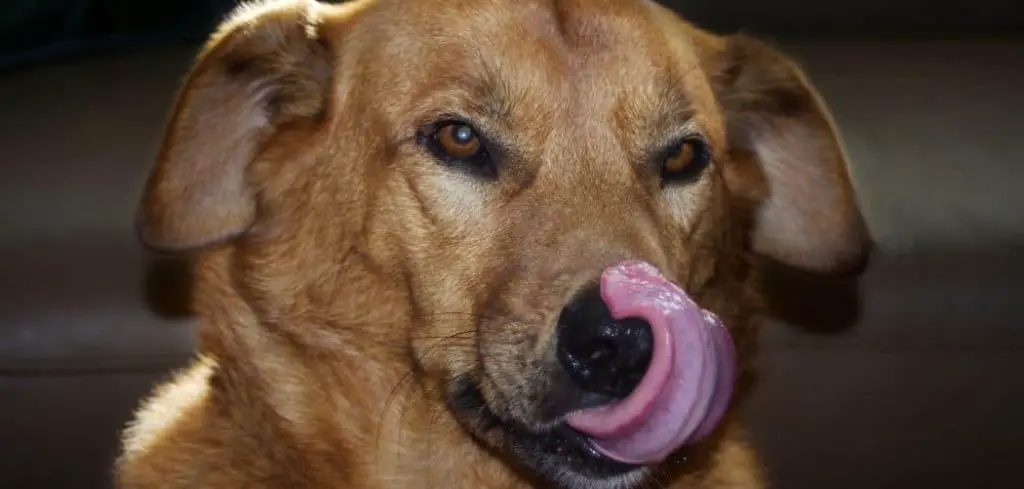Seeing your dog panting and licking lips excessively can be worrying, especially when the behavior is persistent.
While panting and lip licking can be normal in certain situations, when they become excessive, they may signal pain or distress that requires attention.
We outline the common causes of excessive panting and lip licking in dogs, what you can do at home, and when to seek veterinary help.
Dog Panting and Licking Lips Excessively — Why It Happens
Dogs pant and lick their lips for multiple reasons, from normal cooling to serious medical conditions. Anxiety, heat stress, nausea, pain, respiratory illness, and even neurological problems can all cause these behaviors.
Sometimes the combination indicates mild discomfort, but other times it’s a sign that your dog is struggling with something more serious.
Understanding the context and frequency is important in knowing how urgent the situation may be.

Dog Panting and Licking Lips Excessively: Common Causes
Heatstroke or Overheating
One of the most urgent causes of panting combined with lip licking is overheating. Dogs rely on panting to regulate body temperature, and licking lips may occur as they attempt to cool themselves or cope with distress.
Other signs include drooling, weakness, and in severe cases, collapse. Overheating can happen quickly in hot weather, inside cars, or after intense exercise. Heatstroke is life-threatening and requires immediate intervention.
Read more: Dog Keeps Licking Lips and Yawning (What this behavior could mean)
Anxiety and Stress
When dogs feel stressed, they often pant and lick their lips as calming signals. This is common during thunderstorms, fireworks, car rides, or vet visits.
Alongside panting and lip licking, anxious dogs may pace, tremble, or seek constant reassurance. Chronic anxiety not only disrupts daily life but can also weaken a dog’s immune system over time. Addressing the source of stress is key to managing this behavior.
Nausea or Digestive Upset
Panting combined with lip licking can also be a sign of nausea. Dogs experiencing digestive upset may gulp, swallow frequently, or drool as well.
Causes of nausea include dietary changes, ingestion of toxic substances, acid reflux, or underlying gastrointestinal disease. If your dog shows these symptoms after eating or at night, nausea may be the culprit. Ongoing digestive issues should always be evaluated by a veterinarian.
Pain or Discomfort
Dogs in pain often pant as a response to stress and discomfort, while lip licking may be a coping mechanism. Pain can originate from arthritis, injury, internal illness, or surgery recovery.
Other signs include restlessness, reluctance to move, whining, or changes in appetite. Because dogs instinctively hide pain, behaviors like panting and lip licking may be subtle indicators that something is wrong.
Respiratory or Heart Problems
Panting is a hallmark sign of respiratory or heart conditions, and excessive lip licking may accompany the struggle to breathe comfortably. Dogs with respiratory disease may cough, wheeze, or have difficulty lying down.
Heart disease can cause panting due to reduced oxygen circulation, often paired with fatigue, weakness, or fainting. These conditions are serious and require veterinary care.
Neurological Disorders
In rare cases, excessive panting and lip licking may stem from neurological issues. Seizure disorders, brain disease, or nerve dysfunction can trigger repetitive, unexplained behaviors.
Other red flags include tremors, circling, confusion, or loss of coordination. Because neurological problems can progress rapidly, early evaluation is essential.
Read more: Dog licking lips excessively (What it really means)
What to Do If Your Dog Is Panting and Licking Lips Excessively
If your dog is only occasionally panting and licking lips during heat, stress, or excitement, you may not need to worry. Ensure they are in a cool, comfortable environment and have access to fresh water at all times.
During hot weather, avoid vigorous exercise and never leave your dog in a car, even briefly. If anxiety is a trigger, provide a calm environment, consistent routine, and consider calming aids like pheromone diffusers or soothing background noise.
For dogs with sensitive stomachs, smaller, more frequent meals and avoiding sudden diet changes may help prevent nausea. Keeping track of when the behavior occurs can provide valuable clues to share with your veterinarian.
Dental care is also essential. Oral pain can make panting and lip licking worse, so regular dental check-ups and cleanings are important. If you suspect pain, dehydration, or another health problem, it’s always safest to consult your vet rather than waiting.
When to Call or Visit Your Vet
Seek veterinary care immediately if your dog is panting heavily and licking lips excessively in hot weather, as this may indicate heatstroke. Early intervention can be life-saving.
If the behaviors are frequent and come with vomiting, diarrhea, drooling, or loss of appetite, gastrointestinal illness may be to blame. These issues need timely treatment to prevent complications.
Dogs that pant excessively at rest or struggle to catch their breath may have respiratory or heart disease. Prompt veterinary attention is crucial in these cases.
Any signs of neurological problems, such as tremors, disorientation, or seizures, also require urgent care. These conditions can deteriorate quickly without treatment.
Finally, if panting and lip licking persist daily without a clear cause, schedule a veterinary exam to rule out hidden pain, illness, or behavioral conditions.
Read more: Dog Excessively Licking Lips at Night (Causes to watch for)
Key Takeaway
When a dog is panting and licking lips excessively, it can be more than just a passing behavior. While heat, stress, or mild nausea may be responsible in some cases, it can also point to serious conditions like heart disease, respiratory illness, or heatstroke.
By observing the context, providing comfort, preventing overheating, and supporting digestive and dental health, you can reduce some of the common triggers.
But if the behavior is persistent, severe, or accompanied by other warning signs, contacting your veterinarian is the best step to ensure your dog’s safety and well-being.
